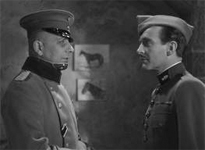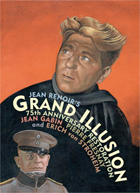Grand Illusion (La grande illusion)
|  Digitally restored for its 75th anniversary theatrical re-release, Jean Renoir’s masterpiece Grand Illusion (Le grand illusion) remains a monumental humanist work that does what all great works do: It transcends the specifics of its time and place and speaks to us in a universal language. Renoir wrote in Cahiers du cinéma a year after its 1937 release that he made the film because he was a pacifist, a bold claim at a time when pacifism in Europe, which was on the brink of war, was generally associated with cowardice. The film deftly proves otherwise: It is a brave work both thematically and artistically, resisting simple categorization even as it taps into universal emotions, memories, and desires for community and compassion. It is not so much an anti-war film as it is a film that celebrates the potential for human decency in the worst of situations, a stance that resonates more with the poetic than the political. Renoir, himself a veteran of World War I who had served as an officer in both the cavalry and the air force, was not naïve enough to think that the cinema could dissuade the world from going back to war, but he did recognize that it could celebrate the beauties of shared humanity in a time of impending chaos. Digitally restored for its 75th anniversary theatrical re-release, Jean Renoir’s masterpiece Grand Illusion (Le grand illusion) remains a monumental humanist work that does what all great works do: It transcends the specifics of its time and place and speaks to us in a universal language. Renoir wrote in Cahiers du cinéma a year after its 1937 release that he made the film because he was a pacifist, a bold claim at a time when pacifism in Europe, which was on the brink of war, was generally associated with cowardice. The film deftly proves otherwise: It is a brave work both thematically and artistically, resisting simple categorization even as it taps into universal emotions, memories, and desires for community and compassion. It is not so much an anti-war film as it is a film that celebrates the potential for human decency in the worst of situations, a stance that resonates more with the poetic than the political. Renoir, himself a veteran of World War I who had served as an officer in both the cavalry and the air force, was not naïve enough to think that the cinema could dissuade the world from going back to war, but he did recognize that it could celebrate the beauties of shared humanity in a time of impending chaos.The story, which is roughly divided into three parts, takes place in France and Germany during World War I. In the film’s opening section, we are introduced to Cpt. Boeldieu (Pierre Fresnay), an aristocratic career officer, and Lt. Maréchal (Jean Gabin), a blue-collar pilot. In the first of the film’s crucial elisions, Renoir uses a simple dissolve to bridge the scene in which they leave for a mission and their being brought into a German officer’s quarters after having been shot down. By leaving the war off-screen, Renoir keeps us focused on the men and how they comport themselves as captors and captives. The violence of battle is not ignored (we see it in Maréchal’s wounded arm, for example); rather, it is used as a backdrop, informing everything that occurs without demanding center stage. That crucial dissolve is followed by a curious scene that will be all but unintelligible to modern audiences accustomed to war film that stress brutality and death: Boeldieu and Maréchal are invited by Cpt. von Rauffenstein (Erich von Stroheim), the German pilot who shot them down, to join his officers for a meal—a signal of mutual admiration and respect that transcends simplistic divides between “us and them.” Boeldieu and Maréchal are sent to a German offizierslager (a prisoner-of-war camp for officers), where they meet several other captured French officers, including Cartier (Julien Carette), a spirited jokster who was an actor before war broke out, and Lt. Rosenthal (Marcel Dalio), the son of a wealthy Jewish banking family whose weekly packages keep the men well fed. The French soldiers busy themselves at night digging an escape tunnel, a project that requires a great deal of collaboration among everyone, including Boeldieu, whose aristocratic leanings tend to isolate him from the others. They also amuse themselves by planning a musical revue using boxes of costumes sent from Paris (many of which are women’s dresses, resulting in the amusingly subversive image of soldiers having a grand ol’ time cross-dressing). Renoir balances the film’s humor with stark reminders of the dangers of wartime, including Cartier nearly suffocating in the escape tunnel and Maréchal’s psychological breakdown after he is put in solitary confinement. Before the tunnel can be completed, the men are moved to several other camps, and Boeldieu, Maréchal, and Rosenthal eventually wind up at a mountaintop castle in Wintersborn that is reserved for prisoners with multiple escape attempts. The camp is overseen by none other than Rauffenstein, who, since we last saw him, was shot down, resulting in a broken back and burns over most of his body, which forces him to wear an orthopedic back and neck brace that gives him a rigid, unyielding physical appearance that belies his inherent decency. This middle section of the film focuses primarily on Rauffenstein’s growing friendship with Boeldieu, in whom he sees a fellow aristocrat and career officer. Both men regret the decline of the aristocracy and all that it represents, and even though their sense of community is based on a shared exclusion of others, both men remain fully human via their actions— Boeldieu’s eventual sacrifice for his fellow countrymen and Rauffenstein’s conflict between his duties as the camp commander and his affection for Boeldieu, who he comes to see as a confidant. The film’s third section follows Maréchal and Rosenthal after they have escaped from Wintersborn and are making their way on foot through the German countryside toward safety in Switzerland. Here the film’s theme of human connection and unexpected decency is embodied in Elsa (Dita Parlo), a German widow who lives on a farm where Maréchal and Rosenthal temporarily take shelter after Rosenthal hurts his ankle. Instead of turning them over to the German army (which she has the easy opportunity to do when they march right past the farmhouse), Elsa instead takes them in, perhaps seeing their survival as some kind of balance to her own wartime losses, which include her husband and three brothers. For a while Maréchal and Rosenthal form a kind of makeshift family with Elsa and her young daughter, although the ideal is not eternal, as the men must continue their journey, which Renoir concludes on a note of mixed emotions: While they successfully make it to Switzerland, dialogue between the two men in which they joke about having to return to their respective military positions ensures that the cycle of human violence will continue. Compassion, as Renoir shows, exists within a world of horrors, not apart from it. Although Renoir and his cowriter Charles Spaak has a difficult time finding funding for Grand Illusion (producers were wary of yet another war film), it turned out to be a massive commercial and critical hit internationally, filling theaters in France and winning a special jury prize at the Venice Film Festival, as well as awards from the New York Film Critics Circle and the National Board of Review (it was also the first foreign-language film to be nominated for a Best Picture Oscar). Hitler, ever the humorless anti-humanist, banned it, while Franklin D. Roosevelt declared that “every democrat in the world should see it” and Orson Welles picked it above all others as the one film he would save. As with many of Renoir’s films, Grand Illusion evolved continuously during production, to the point that Spaak, on seeing the final cut, felt that his name should be removed from the credits because it deviated so much from the original script. Part of this was economically determined (numerous scenes set on airfields had to be cut because the producers didn’t have enough money), but it was also partially influenced by the casting of the great German director Eric von Stroheim as Rauffenstein, who had previously been a relatively minor, undeveloped character. Renoir and von Stroheim collaborated on turning him into one of the film’s most memorable elements, with many of his character traits (including his back brace and overly ornamental uniform) originating with von Stroheim and being carefully nurtured and tamed by Renoir. While Rauffenstein is often surround by production design that borders on camp (note his elaborate bedroom situated in the castle’s chapel, with his bed sitting beneath an enormous crucifix), von Stroheim brings to the character a powerful sense of dignity, such that we feel the depths of his discomfort and even humiliation at being reduced to a bureaucrat rather than a soldier by his injuries. He and Pierre Fresnay have a powerful on-screen chemistry, as do Jean Gabin and Marcel Dalio (Maréchal’s brief romance with Elsa, on the other hand, is one of the film’s weaker elements, not because of any deficiency in the performances, but rather because it feels like an unnecessary narrative flourish). What we ultimately remember about Grand Illusion is not so much the details of the plot but rather the feelings of compassion and shared humanity it engenders. We might very well find ourselves marveling at the displays of human decency and how Renoir balances and tempers them with harsh truths lest the film become mawkish and sickly in its idealism (when Maréchal, fully frustrated with Rosenthal’s physical limitations due to his twisted ankle, explodes in a tirade of anti-Semitism, it is a genuinely shocking moment that is not easily resolved). The film’s ambiguous title constantly draws us toward some kind of ironic reading of the film—what, after all, is the grand illusion? Earlier drafts of the screenplay suggested that the illusion was shared humanity and community, but that darker view receded in subsequent revisions both before and during production. In later interviews, Renoir would claim that the title was purposefully vague because he didn’t want the film to have a clear, direct message. Yet, despite its ambiguities, Grand Illusion is clearly a film that seeks the best in men in the worst of conditions, a powerful goal it achieves with great poetry and emotion. As Renoir himself put it, the film became “simply a cry, the affirmation of a conviction. I had the desire to show that even in wartime the combatants can remain men.” Copyright ©2012 James Kendrick Thoughts? E-mail James Kendrick All images copyright © Rialto and Studio Canal |
Overall Rating: 


 (4)
(4)


